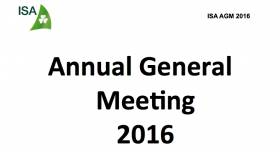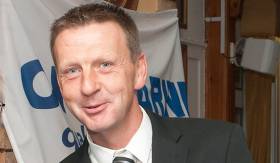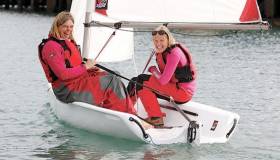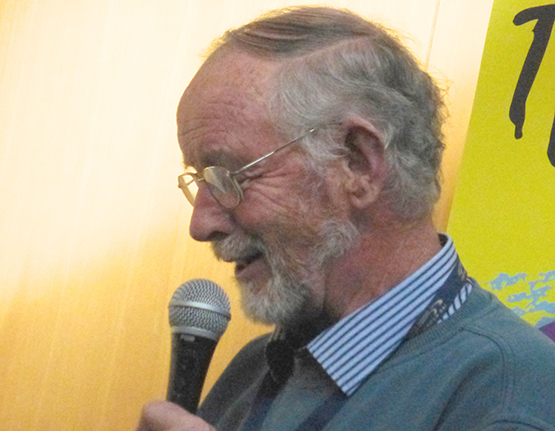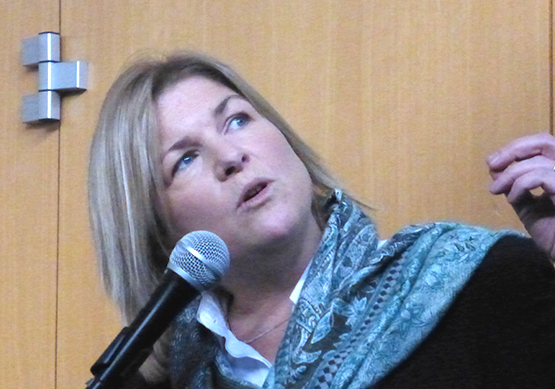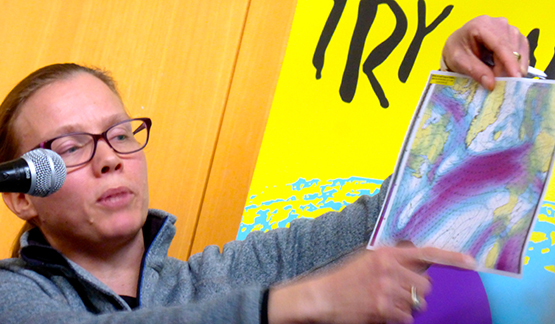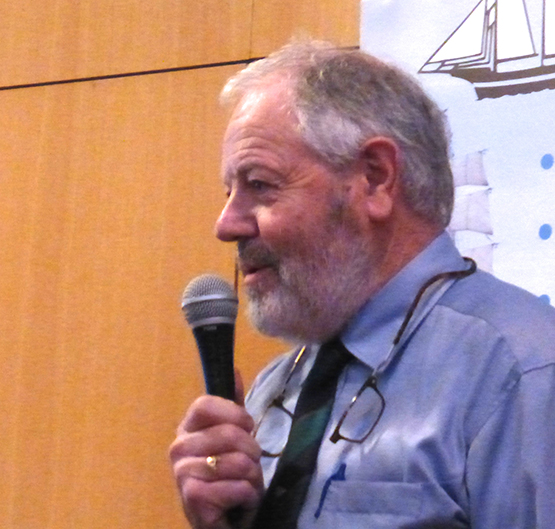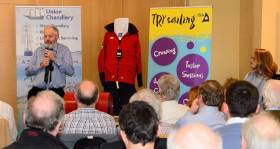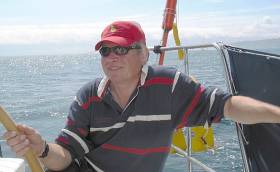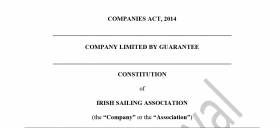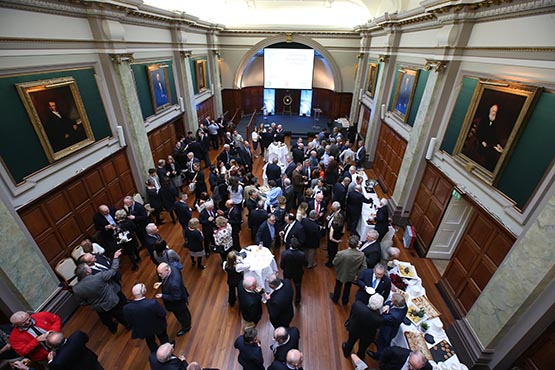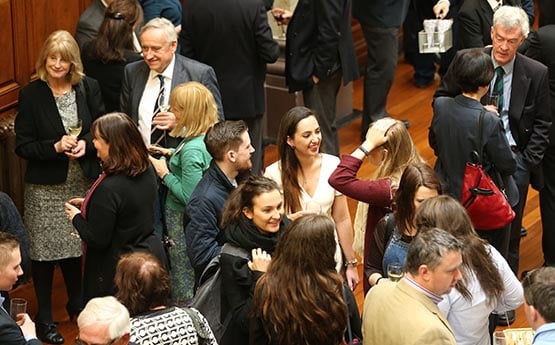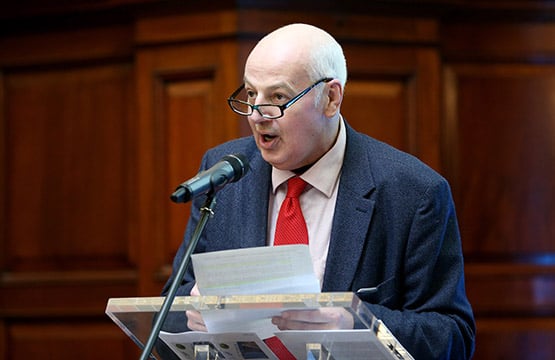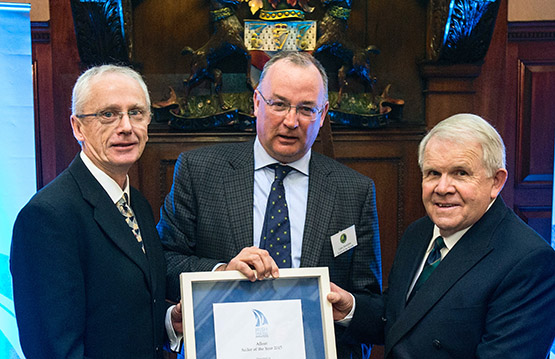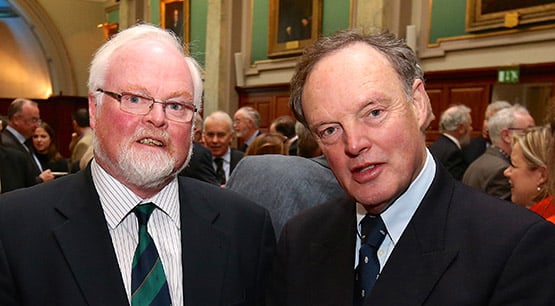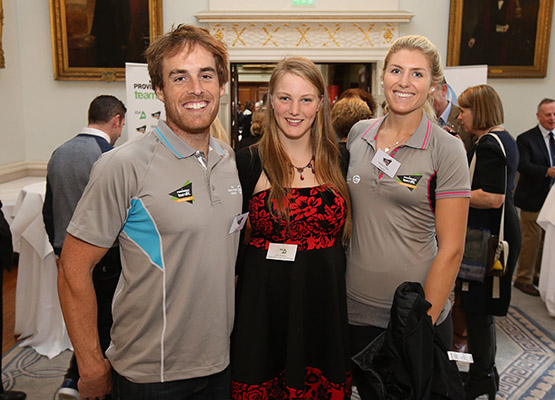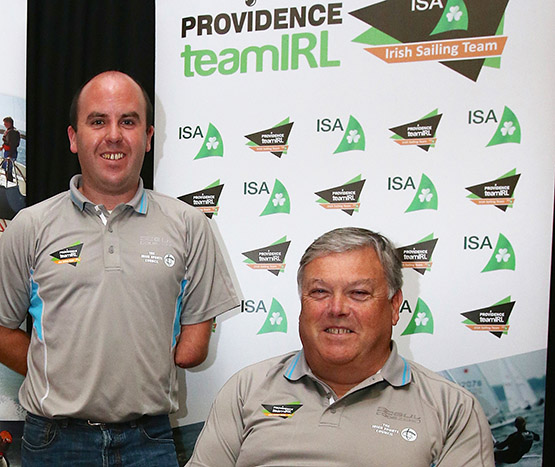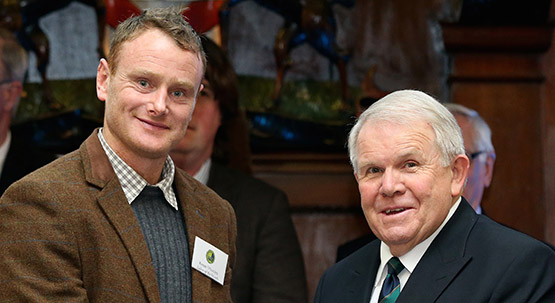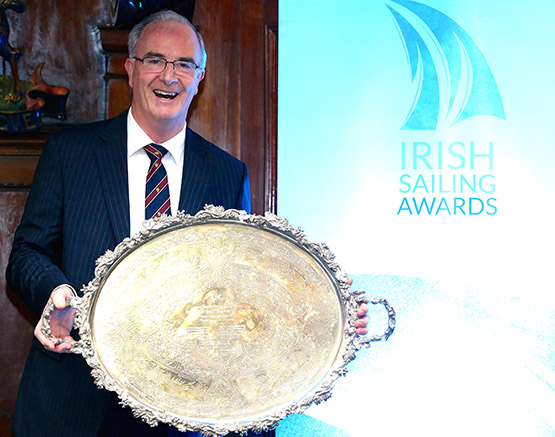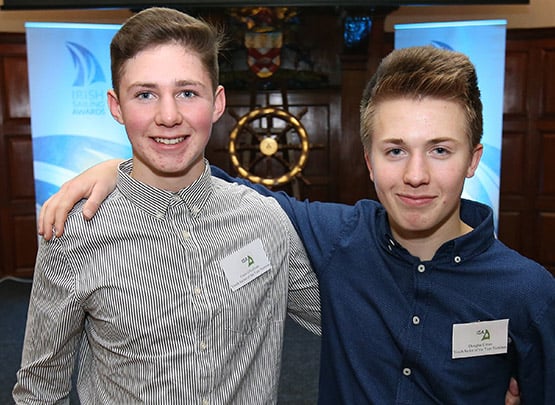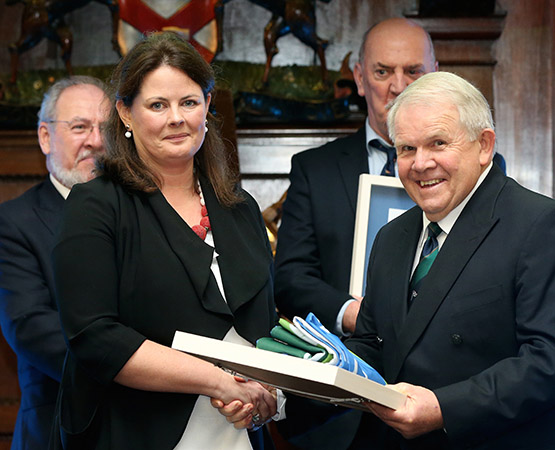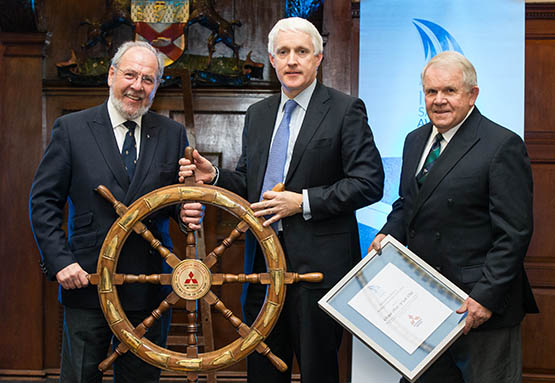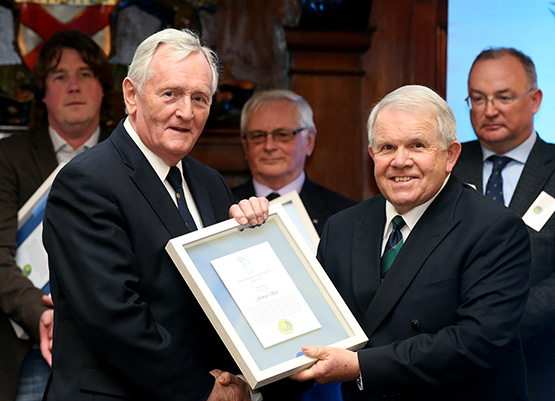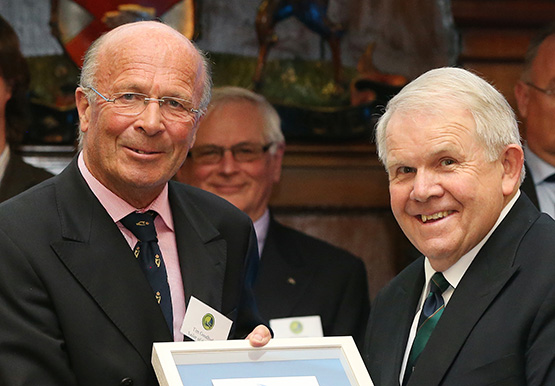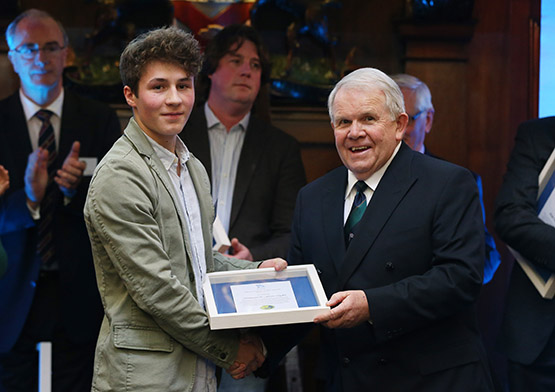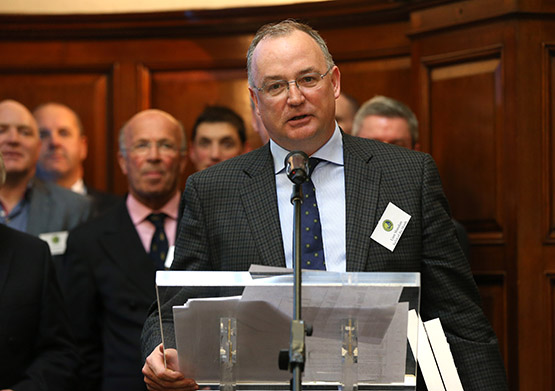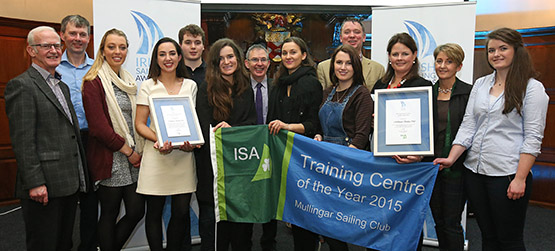Displaying items by tag: Irish Sailing Association
President's Report of the Irish Sailing Association AGM
Ladies and gentlemen welcome to the AGM of the Irish Sailing Association, now in its 70th year since its foundation in 1946, as the Irish Dinghy Racing Association. In 1946, when the sole requirement was to promote dinghy racing, little did our founding fathers realise what their brainchild would grow into. Today, it is the shear diversity of watersports in Ireland that is difficult to comprehend. Hardly a year goes by without some further extreme form of sailing being conceived and attracting its following. It is sometimes difficult for the Association to keep track of developments let alone find ways of representing them!
A quick look across the diversity of our sport gives some idea:
- Dinghy racing, covering the range from optimists to 49ers
- Keel boat racing from Squibs and Glens to top of the range Commodore Cuppers
- Cruising sailors, who by their very nature are lone sailors
- Surfboarders and Kiteboarders
- Power boating
- Add into that the administration of racing and handicaps, international representation, regulation and inspections, lobbying and complying with ever changing and evolving legislation, gives you some idea of the workload of the ISA.
Over the past two years, one thing that has struck me is the fact that each of these groupings is independent of the others and is really oblivious as to what the ISA is doing for the sport generally and for other groupings. This proves difficult, because into the mix you also have to add in the wide range of classes, clubs and training centres. So, if we have not implemented all the changes that your class, or club or training centre hopes for, please bear with us, we will get to you.
Having said that, we are making progress and 2015 has been another year of change and achievement. It must also be remembered that we are only in year one of a five year implementation plan as set out in the Strategic Plan, which was approved by last year’s AGM.
I, and indeed Irish sailing, is most fortunate in having a Board of dedicated Directors, who give tirelessly of their time:
Brian Craig: Training and Coaching
David O’Brien: Secretary
Paddy McGlade: Cruising and Risk and Governance
Sarah Byrne: Dinghy racing classes
Colm Barrington: Olympic Steering Group and High Performance
Robert Dix: Representation
Pierce Purcell: Access and Participation
Jack Roy: Racing
I would also like to thank Roger Bannon, our Treasurer for the past twenty months, who, due to pressure of work had to stand down a short while ago.
A quick review of the major achievements of the past year shows the following:
Dinghy Racing Classes:
One of the main objectives here has been to improve communications with the dinghy classes. However, there is still a lot more to be done in this area.
The Club Racing Classes survey, in addition to the communications issue, highlighted the large segmentation of dinghy classes, which, given the smallness of the Irish market, is a major issue
The Regional Development Officers have worked closely with clubs and classes to identify local Club ‘pathways’ that will build on local/regional penetration to improve competition.
The introduction of Dinghy Fest by Royal Cork Yacht Club was a very positive event and it is hoped that events of this nature will help promote dinghy sailing. The initiative has been taken up by Galway, who will run Dinghy West in 2016 and dates for Dinghy Fest 2017 are already under discussion. I would urge sailors to support this event and other such events where classes combine to run regional and national championships.
Looking to this year, there is a very extensive schedule of work planned:
- Consult with classes to examine fall out at youth level.
- Facilitate Event Calendar discussions with classes starting late August, November is too late.
- Renewed emphasis on promotion of double-handed dinghy sailing
- Carry out a junior and youth survey, with a target date of late April/early May. This will further inform on how the ISA as well as club and classes can formulate policy and initiatives to transition and retain more sailors into adulthood. It should be noted that while we have heard from parents and classes, we still have to hear from the youth themselves, this will be important as they are the lifeblood of our sport.
- The Racing Policy Competition Policy Group, as defined by the 2016 focus group, will be reformed to some extent to reflect representation from those who will deliver on the ongoing needs of the group as defined by the focus group and objectives reflected in the Strategic Plan.
- Promotion of third Level Sailing & Racing:
• Liaise with College Sports Administrations, we will look to provide support for organising events, event management, what is required, to run College Club and Intervarsity circuit successfully.
• Raise profile in the media, while this is up to college sailors themselves, we plan to give them guidance on how to proceed.
• Promote student transition and involvement in keelboat racing. Howth Yacht Club has been successful here with their K25 group. This concept to be explored and expanded where possible. Work with local clubs to identify opportunities to expand into keelboats on a more regular basis and build on the success in CIT and UCC last year with the 1720 event
• Club Pathway definition by Regional Development Officers to assist transition to ‘adult’ classes & encourage race formats for distinct groups of junior/learner racing to ensure:
i. Accessibility and sustainable participation at Club and local level.
ii. ICRA Crew Point initiative will assist in putting more keelboats on the water over time.
Two important issues which were raised in the Satisfaction survey with Classes are:
• Event management templates and documents to be developed for the ISA elibrary, which will be accessed through the website. These will be aimed at assisting classes, clubs and colleges to develop standard documents to maintain continuity when administration changes and give:
o Class specific event guidance to host Club and Race Officer
o Event management guidance documents and checklist
o Post event evaluation for clubs and debrief checklist for clubs and classes
o Classes coaching and clinic template guidelines
• Many clubs identified a gap between Try Sailing, formal courses and transition to racing for youth and adults alike across dinghies and keelboats. The policy group will work with Training Policy Group to build a simple, structured achievable learning program, with delivery by clubs, class sailors, instructors or coaches
Cruising Policy Group:
In promoting cruising, we have been very careful not to transgress into the domains of the Irish Cruising Club (ICC) and the Cruising Association of Ireland (CAI), both of whom represent cruising sailors. However, as there is a large group of cruising sailors who are members of the ISA, we felt that we had to actively support their activities.
The newly formed policy group decided to continue to develop some of the suggestions from 2014. The main one being, holding a Cruising Conference. The event went extremely well with good quality speakers, good range of topics and an oversubscribed attendance.
Naturally we have learnt from the event in terms of length of time speakers were given, need for fewer speakers, bigger venue etc. In the future, it is likely that there will be a half day conference in the odd years in the regions (Cork area 2017, Galway area 2019, for example) with a one day conference in the Dublin area on the even years. This ties in with RYANI on the odd years.
We joined the CoolRoute project to keep informed of their progress and to contribute where possible.
The group drafted and published Guidelines for running a Cruise in Company (1 day, weekend and weeklong cruises). They have also updated and added to the Cruise Routes around Ireland and plan to enhance these with better chartlets.
We continue to assist CAI and there have been discussions with their Commodore on activities they might consider to create more opportunities for CAI members to meet and interact.
Risk Management and Governance:
The Board re-drafted the Code of Conduct for ISA Directors from a Sport Ireland template.
We also have a new Risk Policy Procedure (with help from RYANI), and a new Risk Register.
During the year, in collaboration with Sport Ireland, the Board undertook a review of its workings and communications. This led to a detailed report being prepared by the Institute of Public Administration. This led to a document on the Roles and Responsibilities for ISA Directors and this is currently being studied by the Board to see how it can inform the work plans for 2016 and beyond.
Training – A Year of Transition:
2015 was a year of transition for ISA Training as the significant decline in activity and the reduced satisfaction, as recorded in the Strategic Review, in ‘the ISA training product’ necessitated the reorganisation of ISA Training in late 2014.
The Staff, Instructor Trainers and Training Policy Group had a busy 2015 bedding in the new structures put in place to improve the support to member clubs and centres; introducing changes to make Instructor qualifications more attractive and standards more consistent; while also planning some of the more fundamental changes for 2016.
Small Boat Sailing Scheme:
A number of changes were made following feedback on the Small Boat Sailing Scheme (SBSS):
The changes initiated for 2015 were:
• Instructor revalidation period extended from 3 to 5 years.
• Instructor Revalidation Courses reduced from a two-day into a one-day ‘practical skills’ course organised directly with training centres.
• VHF Licence no longer a mandatory prerequisite for dinghy instructor
• Outsourced the provision of Emergency Care course element at reduced cost to aspiring instructors
• Pre entry Course - theory elements put online by way of sample background papers.
• Instructor Pre entry and Revalidation Courses - developed an Explanatory Guide with the Instructor Trainers to ensure each element of the assessments are marked consistently across the Instructor Trainer panel.
Instructors:
The availability of qualified Instructors to clubs and centres remains a key area of attention. While progress was made in 2015 we continue to focus on improving the skills, the consistency in standards and the availability of Instructors and Senior Instructors. In this key area of ISA Training we:
• Certified 485 instructors (45% Increase on 2014)
• Certified 79 Senior Instructors (44% Increase on 2014)
• 68 Instructor Courses and 18 Revalidation Workshops run around the country (similar number to 2014).
• Developed a Senior Instructor assimilation programme to bring long time-lapsed senior instructors back into the fold.
• Partnered with clubs to run 5 Senior Instructor Courses to ensure adequate supply of courses in each region.
New Initiatives:
Last year was also spent planning for the more strategic changes and the piloting of some new initiatives. Thanks to the excellent support received from the Instructor Trainer Panel the considerable work involved has been completed to enable the roll out of a number of fundamental changes, for example:
• The top level SBSS has been revised and streamlined for 2016 with a view to increasing participation and then link with the new Coaching Programme which is under development.
• New Advanced Instructor Qualification is being introduced to reflect the SBSS Course changes.
• The importance of the logbook to be re-established through the introduction of an electronic logbook and Sailing Passport which was piloted last season.
But ISA Training is not only about the Small Boat Sailing Scheme.
On the Cruising side an expert group from the Cruiser Trainers following a consultation process made recommendations to the Training Policy Group on how the ISA and RYA could best work together to provide quality practical and shore based certification to our sailing and motor boat members. As a result, Irish centres providing ISA and RYA practical and shore based courses both now use, as a common standard, the RYA training materials and instructor training processes rather than both organisations resourcing dual systems.
A new Cruiser Working Group has recently been formed under the Training Policy Group to undertake a review of the existing schemes and the wider issues affecting Cruiser Training. We expect these findings and recommendations to be finalised before the year end.
International Accreditation:
Arrangements are underway to have the ISA Training Schemes formally accredited by World Sailing.
A Training Guide for Clubs to assist junior organisers and a Guide to ISA Junior and Youth Classes to help members decide what class best suited their needs were both published on line during the year.
Work is also ongoing on the Windsurfing side and a full review of the National Powerboat Scheme will be undertaken in 2016.
High Performance:
2015 has been a busy year for the High Performance area, especially with Rio on the horizon. In addition, there have been a number of other notable achievements:
• More than 100 young people participating in the High Performance pathway programmes, from all over the country.
• Break-through year for the 420 Academy with our best ever results at Kiel (3rd and 5th) followed up by Douglas Elmes’ and Colin O’Sullivan's Bronze medal at the ISAF Youth Worlds in December.
• Stunning success of youth sailors over the summer, multiple top 10 positions, including Ewan McMahon's Silver at the U17 Laser Radial Europeans and Bronze at the U17 Laser Radial Worlds .
• Inaugural 49er Development squad set up and two teams competed at the Junior Worlds.
• Ryan Seaton and Matt McGovern's 49er Medal Race Finalists at Olympic Test Event and Gold Medal at the recent Princess Sofia 49er Olympic Qualifying Regatta
• Four teams qualified for Rio Olympics: 49er, 49erFX, Laser and Laser Radial. Trials for Laser and Laser Radial places ongoing.
• Successful re-negotiation of carding criteria with Sport Ireland to include results from Under21 championships, ensuring smoother transition from youth to senior
• Confirmation of sponsorship from Providence, GUL and High 5 Nutrition.
• Formation of Irish Sailing Foundation with initial seed capital from Sport Ireland and a private donation enabling the appointment of Jack Gleeson as Foundation Director.
Access and Participation:
2015 saw a new concept and new branding of "TRY SAILING", with banners and flags containing youthful colours and fonts, this has created a strong brand helping to promote the Association’s initiative in attracting new interest in trying sailing, joining clubs and completing courses. It is a warm and welcoming brand receiving a very encouraging response by all establishments in its first year. Over 3,000 people participated in events nationwide in 2015.
This was achieved with a very small budget, and as a result of the initial success, the ISA is increasing the funding considerably for 2016. We are pleased to announce The Marine Institute have agreed to support our campaign for 2016, promoting the sea and its environment.
Full details of the 2016 programme are contained in the appendix to this document.
In addition, we are delighted to be linking up with ICRA’s Crew point initiative, which together, with Try Sailing will provide a complete range of activities from children’s programmes to crewing on cruisers for the more mature person.
However, the ISA can only drive the concept so far and it’s then up to clubs and training centre’s to work with the numbers participating in the various activities and put in place attractive packages to make joining a club or taking a sailing course attractive
Early events will be kicking off with:
• Royal Cork Yacht Club on the 23rd April in Crosshaven,
• DunLaoghaire at the Royal St. George Yacht Club on Sunday 24thApril
• The Irish National Sailing Centre on 15th May
• Galway on 23rd May
Representation Policy Group:
The group’s primary aims for 2015 were to:
• Represent the interests of Irish sailors in respect of statutory affaires and legislation
• Identify strategy for the ISA’s representation on the various committees of ISAF, now World Sailing for the period 2016-2020
• Develop a strategy to effect change in the way Government and state agencies view sailing and lobby to promote safe & responsible participation
Effecting change within the statutory agencies through lobbying is by its nature a slow process and a number of issues are currently under discussion with the relevant departments, for example:
Small Craft Register:
Since the Department of Transport’s request for the ISA to withdraw the ISA’s Small Craft Register on the grounds that it was being used illegally, the ISA has continued its discussions with the Marine Survey Office in introducing the statutory registration system that has been promised. Unfortunately there appears to be little sign that the statutory register will be operational in the short term. The policy group is continuing to work towards a solution.
Green Diesel:
Following the lifting of the EU derogation that Ireland enjoyed for use of tax free diesel for pleasure craft, the solutions that were approved by the Department for buying marked (green) diesel at the rebated (tax-reduced) price still remains. Consumers are obliged to make an annual declaration of the quantity purchased and pay the extra tax by the following March. The ISA is continuing to monitor this issue to allow us to be proactive in the event there are any changes being suggested.
Passenger Boats regulations:
This continues to be a major issue particularly for ISA Cruising Schools. The feedback the ISA is receiving from members is that the implementation of the regulations are inconsistent depending on the interpretation of the surveyors.
ICC’s and Commercial Endorsements:
The Department of Transport conducted an audit of ISA’s systems for the training, assessing and issuing of ICC’s and Commercial Endorsements. Our authority to continue to issue the certificates has been renewed until May 2019.
Dun Laoghaire Harbour Submission:
The ISA sent in a submission to An Board Pleanala and presented at the subsequent hearing in support of the Dun Laoghaire Combined Clubs. The outcome of the hearing is due to be published sometime later this month
World Sailing Representation:
World Sailing is the International Governing Body for Sailing, which was formerly called ISAF. The ISA currently has representation on some of the World Sailing committees. Committees run on a four year Olympic Cycle at the end of which, Member National Authorities put forward their nominations for committee representation. The policy group has revised our strategy for our representation within World Sailing with aims of:
• Identifying and securing the opportunities for hosting international events in Ireland
• Appointment and progression of Irish International Race Officials (Race Officers, Judges and Umpires)
• Establishing and maintaining a network of relationships with international sailing administrators
• Influencing decisions affecting Irish Sailing at all levels; training, racing, race management and Olympic sailing.
All ISA nominations will be made in an open and transparent manner.
Racing:
Sailfleet:
The fleet of J80’s continues to be based in Howth Yacht Club.
The Irish Match Racing Championships were held early in the 2015 season and all 8 boats were used for this event. The entire fleet was used again in Dun Laoghaire in late September for the Senior All Ireland Championships.
The Sailfleet Board continues to monitor the fleet and have recently engaged a professional survey of the each boat to establish what maintenance issues need to be allowed for, this report is currently under review. The fleet will be 10 years old next season and maintenance is a growing issue, the Sailfleet Board continue to look at options for the future of the fleet.
All Ireland Championships:
The Senior All Irelands were hosted by the National Yacht Club. On the water Anthony O’Leary from the Royal Cork Yacht Club, and reigning 2014 Champion, sailed superbly to win back to back titles. It is worth nothing that this is 7th time out of the last ten years that the O’Leary family name appears on the trophy, an outstanding achievement!
The Working Group operated a totally transparent selection process in 2015, this along with better communication with the classes in general, has helped greatly in everyone’s understanding of who and how nominees are selected.
By establishing the last weekend of September for the Juniors and the first weekend of October for the Seniors, classes now know each season what the dates are so conflicts can be avoided. The 2016 Junior‘s are being hosted by the Fastnet Marine Outdoor Education Centre in Schull utilising their TR4.2 class a move away from the ISA Topaz fleet. The Senior’s will be hosted by the Royal Cork YC where we are delighted to announce that the National 18 class have enthusiastically offered a fleet of their exciting new designed boats for the event.
ICRA:
The ISA continues to work closely with the Irish Cruiser Racing Association (ICRA) in all aspects of the very important cruiser racing sector of our sport. We have recently concluded an agreement with ICRA which will lead to closer cooperation and understanding between the two bodies. This will be important in the areas of developing a cruiser racing coaching scheme, linking Crew Point and Try Sailing and possibly developing a keel boat academy.
Race Officials:
The Race Officials Policy Group continues the duties of managing officials, including all disciplines, who officiate at our racing events. Within this Policy Group, all aspects of training and education of our race officials is coordinated.
During this last year we have built on already good relationships with our neighbours in the RYA, who are rightly accredited with having the best experience and training courses, in relation to all aspects of Race Management. We will continue to work closely with the RYA Race Management team which will be of great benefit to all our officials. In the same vein we have re-engaged with the Eurosaf Officials Exchange program which promotes a system whereby National Judges, Umpires and Race Officers can get experience at European events.
In addition to running courses on Race Management, Jury, Protests procedures, and Rules, throughout the year, a most successful Race Officials Conference was held in Dublin in February with 85 attendees. There was a full day of workshops and lectures which was very well received by all. There are new courses available to clubs and individuals on Mark Laying and an updated Race Management Course for Regional and National Race Officers.
Certificate of Identity:
The ISA is consolidating the various details currently held on boats belonging to ISA members in order to streamline the ISA’s several databases of craft, and to build a complete database of craft owned by ISA members. We will encourage members to apply for a Certificate of Identity which will incorporate all the services ISA members avail of in respect of their craft into a single document. This will include racing handicaps administered by ISA, racing sail numbers issued by ISA as the member national authority for World Sailing and other services.
More details on the Certificate of Identity will be available soon on the ISA website
So, as I think you will have seen, there has been a lot of activity during the past year.
In conclusion, there are a number of people, whom I want to thank:
Firstly, my board of Directors, all of whom have put in a lot of hard work over the past year.
Next, the staff of the ISA, ably led by our CEO, Harry Hermon. I know from personal experience that the staff put in very long hours and are completely committed to work of the Association.
And finally, I want to acknowledge and thank most sincerely all those who have joined our policy groups and who are contributing to help shape the policies and thinking that will drive the ISA and Irish sailing forward. Thank you.
Appendix:
Try Sailing 2015
52 clubs and centres Nationwide with over 3000 participants.
2016 Try Sailing Activity
Try Sailing Initiatives
1. ISA Try Sailing Launch – Monday 2nd May, Kinsale Yacht Club, incorporating -
• Schools Try Sailing and Sailability Try Sailing with -
i. Media invite,
ii. Linking with local fishing community & infrastructure,
iii. Story board for the day “embracing our waters for all they have to offer”.
• Linking –
i. Cork Sports Partnership support,
ii. ISA bursary support,
iii. ISA Sail Fleet,
iv. Sports Capital Funding club boats,
v. Marine Institute objective of embracing the sea.
2. Promotion plans for 2016
• Flags and banners for all participating clubs and centres.
• Try Sailing bumper stickers.
• #trysailing Instagram.
• #trysailing and #adventureireland twitter tagging.
• Bespoke gif for all participating clubs on line advertising.
• ISA search map included Try Sailing events.
• Exhibiting at Seafest 2016 in Galway.
• Outdoor signage for shared use.
• Facebook promotion.
• PR and social media outreach to Irish outdoor adventure market place.
3. ISA Try Sailing Bursary
• New bursary for a total of 75 applicants of €200 (total €15000).
• Forms have gone out to each club and training centre
• Currently awaiting applications
• Closing date for application 5pm on 15th of April 2016
• Try sailing Toolkit & info here http://www.sailing.ie/clubs/trysailingeventplanning/
• RDO responsible Gail MacAllister
4. Schools Try Sailing
• The Local Sports Partnerships will be funding clubs to run a primary and secondary school events in Category 1 clubs (3hr event)
• The target is children who are NOT club members
• LSP will provide each club with €300 to run both events (covering instructor and fuel costs)
• ISA RDO team have designed a flyer/poster, the LSP’s are printing and distributing these to each school in their area.
• Each poster has contact details and the dates of when the Try Sailing session it to happen in their areas clubs.
• Participants must register their interest with a club appointed contact and pay €5 on the day to take part
• If a club can cater for 20 children in each of the two sessions (morning and afternoon) it would be €500 for the club.
• Waterford, Wexford, Fingal, Dun Laoghaire Rathdown, Wicklow, Dublin City, Louth and Fingal Local Sports Partnerships are supporting the programme with 20 Cat 1 clubs participating in this in the East region in or around April 23rd 2016.
• The East Coast area alone will include distribution of ISA information up to 1008 primary and secondary schools and the East and South East coasts.
• Cork, Clare and Kerry Sports Partnerships also supporting same programme with 10 Cat 1 clubs participating on variety of dates that suit the regions.
• Donegal, Sligo, Mayo, Galway also supporting same programme with 8 Cat 1 clubs participating on variety of dates that suit the regions.
• Linked in with Schools Active Week programme – all dates published on line.
• East Coast RDO responsible Sarah Louise Rossiter
• South West RDO Gail MacAllister
• North West RDO Ciarán Murphy
5. Scouts Try Sailing initiative
• Working with the Scouts
• Programme not fixed yet, details to be announced
• RDO responsible Ciarán Murphy
6. Surf ‘n’ Turf (local rugby club with boat club event)
contact [email protected]
• Event: Wexford Wanderers and Wexford Harbour Boat & Tennis Club
• Target Market: Other sports club members and corporate day
• Preparation: Meeting with local rugby team, posters in local businesses and clubs involved in the day
• Promotion: Posters designed with information. €50 per team of min 7.
• Minimum of 3 females on each team. One liaison for booking teams.
• On the Day: 10-10:30am meeting. Start tag rugby at 10:30am – 12:30pm. BBQ at 1pm in sailing club, on the water 2-4pm.
• Next Step: Introductory membership and dual club membership specials. Information on clubs summer courses, adult courses etc. Encourage continued groups or a tag rugby/sailing monthly session.
• Top Tips: Good connections can be made with any local sports club whether golf, GAA or cycling. The same principle of this initiative applies.
• RDO responsible Sarah Louise Rossiter
7. Women on the Water
• Cork Sports Partnership and Clare Sports Partnership are supporting Women on the Water programmes of €200 towards running a Women on the Water programme in 2016.
I Believe Sailing is a 'Sport For All'
I am a passionate believer in the concept that sailing is ‘a sport for all and a sport for life’. I took to heart a slogan to this effect promoted by the Irish Sailing Association a few years ago. I have advanced that concept since I first heard it. Nowadays I wonder if how many true believers there are in this concept. While I fully support the need for a national sailing association and believe that it means what was said about ‘a sport for all’ I don’t see that concept, simple, direct and embracing in its description advanced as a major focus of the Association. I may be missing something but when last did you see the ISA state this concept forcefully in a public message?
I do not want to be perceived as a critic of the ISA because I am not. I am committed to the essential necessity of sporting representation through a strong national organisation. However, having observed, listened to and received various approaches in recent years from those who have challenged the ISA and, in fairness to them and the ISA executive authorities, created a degree of change, I have a degree of concern that the effective level of national association relationships with and to clubs and ‘the ordinary’ club sailors (not a particularly nice description but perhaps apt), could do with more attention.
I chaired a debate on whether sailing is a welcoming sport at the annual conference of the Irish Cruiser Racing Association in Limerick and was encouraged by the response of delegates there, but they also raised questions about the Irish Sailing Association. It has launched a ‘Try Sailing Initiative’ through associated clubs and training centres. “This is building on last year’s inaugural success of this approach,” Gail McAllister, ISA Regional Development Officer for the Southern Region, told me. “The ISA is partnering with the Marine Institute in Galway and this will see a thorough implementation of initiatives and a strong promotional campaign introducing the public to the joys of sailing. We have a firm belief that you have to take your message to the people at least as much as you expect people to come to your club. We want to make it clear that all are welcome - and genuinely welcome at that.”
I agree with and support those comments. Effort is being put into raising participation levels in the sport. There are attempts to counteract falling membership numbers and an ageing profile amongst boatowners in many. It is my view that the sport is more popular than it was in past years, despite a fall-off in numbers in recent times. The challenge is to put in place plans to maintain growth for the future and to remove, once-and-for-all the, image of sailing as being an ‘elitist’ sport.
On my own boat I have a policy of trying to introduce at least one new crew member to the sport every year. May I recommend that to club members throughout the country? Meantime perhaps you would listen to my Podcast this week where I interview the new Commodore of the Irish Cruiser Racing Association, Simon McGibney, the first West of Ireland sailor to hold the post. I spoke to him in Limerick at the end of the annual meeting of ICRA. He is committed to expanding involvement in sailing and in racing and he believes this will happen. At the start of the interview I congratulated this member of Foynes Sailing Club on being the first West of Ireland Commodore of ICRA.
• Listen to Podcast below
ISA Try Sailing Programme 2016
ISA President, David Lovegrove on an enhanced get started initiative
Spring is traditionally the time when most sailors’ dreams turn with eager anticipation to the approaching season. However, the Irish Sailing Association (ISA) has used the dormant months to plan and prepare for the forthcoming season. Shortly we will be launching a number of exciting new initiatives which we hope will help increase participation and also improve the skills of existing sailors.
Following on the success of the pilot programme in 2015, the 2016 Try Sailing programme will see a greatly enhanced package of assistance available. This will include: a Try Sailing Bursary, the Schools Try Sailing Initiative for Primary and Secondary Schools as part of Active School Week, the Corporate Cup Training Programme for new sailors to try Keelboat and Cruiser racing, the Round Ireland Trophy, Volvo Cork Week Try Sailing Invitational Cup and the Scouting Ireland Try Sailing Programme. There will also be Sailability Programmes catering for those Clubs who specifically want to facilitate people with disabilities to enjoy sailing and Family Fun initiatives to encourage club members to bring their family along and try the full extent of what the Club has to offer. The Try Sailing Programme is supported by the ISA’s dedicated Try Sailing website and PR Toolkit and by the Regional Development Officers team who will be on hand to help each Club develop their own Participation Programme.
On the Training side, the new simplified Small Boat Sailing Scheme (SBSS) syllabus and Advanced Instructor Endorsement will be introduced for the 2016 season in conjunction with the electronic logbook and Sailing Passport. These changes are in response to the feedback to put more focus on the development of skills and the logging of time on the water than on the acquiring of certificates. The SBSS will now focus on introducing sailors to the sport, their acquisition of basic skills and encouraging them to experience a broad range of sailing activities. The higher level racing aspects will from now on form part of a new Coaching Programme aimed specifically at those who wish to progress further into competition.
The new Coaching Programme will help existing sailors improve their skills so as to get more enjoyment from their participation in racing. The scheme will be based around Clubs and Classes with the objectives of providing them with a framework to provide a high standard of affordable coaching for their members, the creation of training structures to develop the pool of suitable coaches and the provision of course materials, aids and mentoring to assist this pool of qualified coaches. The objective of this is to help those sailors at club or class level who are not part of the ISA Performance activities.
We will be assisting Classes and Clubs with the introduction of the programme and running a number of pilot projects during the season and look forward to hearing from Classes and Clubs wishing to be involved.
This time of year is also the time of conferences. The Cruising conference was held in Howth Yacht Club on 20 February and was a sell-out success. We were fortunate in having some top class speakers who delivered excellent presentations. The main priority for the representation policy group is the ongoing issue which is causing frustration to many cruising sailors, and that is the current lack of a statutory registration system for small craft. The ISA will continue to lobby hard to try and speed up the process to establish the registration system for pleasure craft. Other areas being addressed include the passenger boat regulations which continue to restrict the activities of our cruising schools. The tax on green diesel and the foreshore licensing issues are also on the policy group's agenda.
The race officials held their conference on 28 February. It was an interesting event with Anthony O’Leary giving the “view from the tiller”. This is always a fascinating session as it gives race officials first–hand feedback of what sailors are looking for in race management.
The new website, which is focused on how the ISA can assist clubs and classes in improving their range of services to their members, is divided into four sections, which reflect the main thrust of ISA activities under the Strategic Plan. The four areas are: Try Sailing, Racing, Cruising and Training. The site will undergo further development in the coming months.
So with all this activity taking place, it only remains for me to wish you well in your preparations for the new season and hope that we all have fair weather.
ISA Cruising Conference Was On Target For Topics And Turnout
Last Saturday’s Irish Sailing Association National Cruising Conference, sponsored by Union Chandlery with full organisational support from the Cruising Association of Ireland and the enthusiastic hospitality of Howth Yacht Club, was able to put through a very complete day-long programme which covered an extraordinary variety of topics. Each area of interest was examined in detail by a leading expert – in some cases the CEO of the national agency involved – and by the end the attendees, who came from all over the country, were verging on information overload. Yet everyone finished the day well satisfied, and certainly agreed on one thing – it will be quite something to match the quality of 2016’s Cruising Conference when the next one comes round in 2018. W M Nixon was there, and though he tells us “his head was melted” with the sheer volume of the range of issues discussed and explained, he’ll do his best to let us know what happened.
It went on for seven hours and more, and ranged from the extremities of dealing with calving glaciers in Greenland at one end, to the niceties of lone male watch-keepers dealing safely and efficiently with the calls of nature in mid ocean at the other. And since you ask, there were two distinct camps for dealing with Problem B – those who favour a simple bottle, narrow enough to be stowed in a convenient winch handle holder, and those who think a yoghurt tub with its cover kept usable is your only man, as some folk need a bit of space to perform.
As for the sheer length of the programme, as a group of friends and shipmates attending together we agreed it should have been an hour shorter. But then we couldn’t think of one single item on the agenda that we would have happily discarded. So for 2018 (or next year, if the current plan to make it biennial is reckoned to be wimpishly unambitious), Paddy McGlade the ISA Board Member for Cruising, and Clifford Brown, Commodore of the Cruising Association of Ireland, will have to agree to the same densely-filled programme, and it’s beholden on the participants and the audience to be up for the challenge.
For the fact is, when you get an attendance of this calibre, you need to provide the full coverage in the programe. And if you’re providing the full service in the form of a very comprehensive conference, then you deserve the attendance of all the keenest cruising folk – or would-be cruising folk – in the entire country. And with a comprehensive turnout of 104 enthusiasts where all nvolved on either side of the programe are incuded - when they’d tried initially to keep the numbers manageably at 80 - the dynamic interaction between performers and audience was magic, and ISA President David Lovegrove was properly impressed.
ISA Cruising Convener Gail MacAllister put together a cracking programme, nicely balancing the serious issues which might have had a certain bureaucratic overtone with more overtly entertaining stuff which hit the button either by scaring us stiff, or else making us savour the pure quiet delight of a proper cruise going well with a contented crew on board.
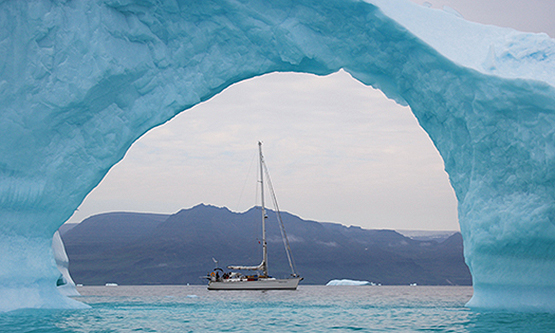
Eddie Nicholson’s Najad 440 Mollihawk’s Shadow in the frame in Greenland. The outline he gave of the pre-planning and execution with shipmates Mike Hodder and Dermot O’Morchoe of this exemplary cruise from Newfoundland eventually home to Ireland was to set the tone for the ISA Cruising Conference.
The tone was set from the start with the all-singing all-dancing account of Eddie Nicholson of Kinsale’s cruise to West Greenland and then on to Ireland from Labrador with the Najad 440 Mollihawk’s Shadow. This was much more than the narrative of an ambitious cruise. Combined with his two leading shipmates Mike Hodder and Dermot O’Morchoe, Eddie makes up a threesome of complementary talents, and their thoughtful account of what goes into planning, preparing and making such a cruise the outstanding success it clearly became was shown in the concluding informative account of what they achieved, once they’d made the effort to put everything in place.
This was obviously at the more advanced end of cruising, so as a balance we next heard from ISA Board Member Pierce Purcell of Galway, who has been on a personal crusade to fire up the interest of all recreational boat owners around Galway Bay. He runs a chandlery at Clarinbridge, and the sheer variety of people from all parts who were coming through his door in quest of maritime items large and small made him realise that his shop was a maritime focal point for the entire Galway Bay area.
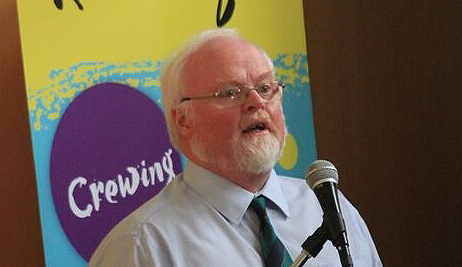
Pierce Purcell of the ISA Board outlining his innovative technique for building up a communications network of recreational boating enthusiasts around Galway Bay
So every time he sold something, he simply asked the customer if he could have their email address to keep them informed of anything that might be in the offing for boaters large and small around Galway Bay. As a result, in the last decent summer, which we had a couple of years ago if you remember, he managed to assemble a fleet of fifty-plus boats for a Bank Holiday weekend muster at Kilronan in the Aran Islands. And as a direct result of that, the WIORA Championship 2017 is going to be staged at the same venue, which will be a remarkable “first”.
The extraordinary opportunities which cruising offers for observing maritime wildlife were then outlined by Simon Berrow of the Irish Whale & Dolphin Group, and his continuing enthusiasm is at such a level that just about everyone present will be on some sort of whale watch in the season ahead.
Dr Berrow is based in Kilrush, and there’s something about the West of Ireland which sets the sailing heart afire, for we then had Daria Blackwell of Clew Bay telling us how women can get much greater enjoyment from sailing if they take steps to learn how to do it themselves, indeed the best thing is to do it well because you want to, not because some mere male needs help.
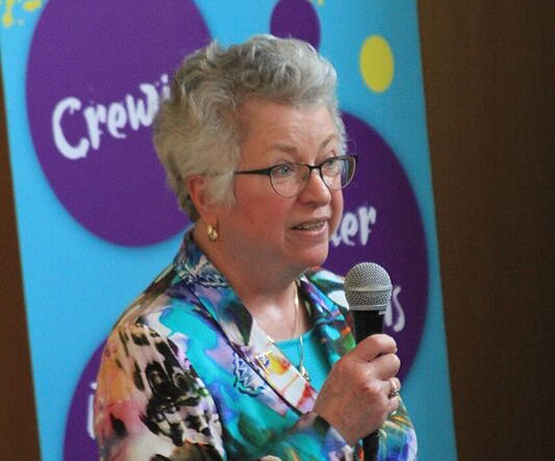
Daria Blackwell delivering the message about women adopting a more proactive role in sailing through having the most positive attitude to learning and practice. Photo: Alex Blackwell
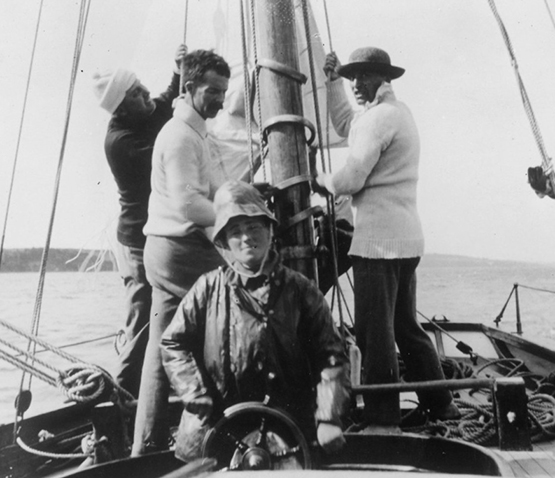
Molly Childers on the wheel aboard Asgard in 1912. She was a much more competent helm than her husband Erskine, and it was she who made such a masterful job of steering the engine-less Asgard into Howth with a strong following wind during the gun-running episode in 1914.
This made it doubly appropriate that the conference was taking place in Howth Yacht Club, for of course in July 1914 Howth witnessed one of the finest examples of skilled helming by a woman when Molly Childers steered the engineless Asgard safely into harbour and alongside in the allotted tight berth for the Irish Volunteers Gun Running, despite a Force 5 to 6 northwest wind from dead astern.
Daria used to be the boss of a 400–employee advertising agency in New York, so when she got the sailing bug she went at it with total dedication. It made for a fascinating presentation as she outlined the different ways that men and women approach something like learning to helm a boat in confined situations.
Apparently we men rely on intuitive learning – we hope to pick it up simply by doing it. And if it involves fixing a piece of equipment, we’d rather have a blind go at it instead of RTFM. But women, according to Daria, want to learn properly - they want to practice, they’re keen to take instruction if it’s properly done, and they want to continue to get it right without feeling nervous about doing it again. Practice and self-reliance – that’s what women bring to enjoyment of sailing. And yes, they do read the manual.
Norman Kean of Courtmacsherry, Honorary Editor of the Irish Cruising Club Sailing Directions, is a typical Royal Institute of Navigation person in that, while he’s ace with all the latest equipment, he has a great love and respect for all the paraphernalia of his art, and he adores charts. But he doesn’t suffer from any illusions about the fact that some of our best-loved charts are based on data so old that a re-survey would show that some narrow channels are not quite where they’d be indicated on an electronic chart, where the original info has had to come from a paper chart.
So in an intriguing presentation he showed us some electronic anomalies of which the most vivid was the slight but crucial mis-placing of the Joyce Sound inside Slyne Head in County Galway, and then he went on to show us how much attention to detail was needed for himself and Geraldine to take their Warrior 40 Coire Uisge into Blind Harbour on Waterford’s Copper Coast.
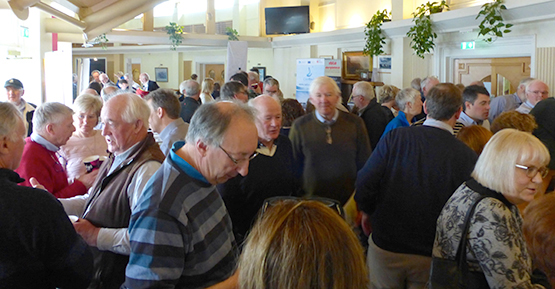
Coffee break. Navigation guru Norman Kean (facing left) talks charts with fellow enthusiasts. Photo: W M Nixon
The organisers maintained a ferocious pace, for before we were allowed to take time for lunch, there was a break-out session with instant groups of eight or so each being formed to discuss various topics on which, at conferences end, one lucky nominee from each group had to produce a considered report. My recollection is that the problem with lobster pot marker lines loomed large, and in our group we’d the good fortune to have Paddy Judge who told us how he’d cleared a pot line which had got between his skeg and rudder – thereby disabling his steering. He’d managed to get to the lobster line by use of a short length of chain with a line at either end, the chain let over the bow with the line to each side, and then worked aft well under water until it could be used to raise the pot line, which was running vertically downwards from the rudder.
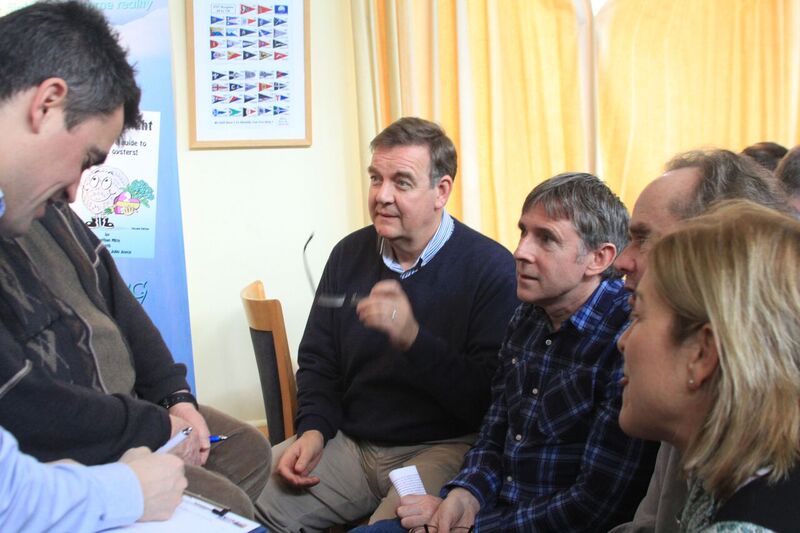
Taking a day off from the general election, RTE News Presenter Brian Dobson was one of 104 cruising and offshore sailors who took part in the ISA Conference. Photo: Alex Blackwell
The whole business of virtually unmarked pot lines all round the Irish coast is becoming such a problem that we’ll probably have a blog completely devoted to it one day. But the good news from Saturday is that the energetic Gary Davis of the HYC Cruising Group has been so determined in his lobbying of politicians and government departments regarding the menace of poorly-marked pot lines that it’s now on the official agenda, which is quite a step forward from the previous apparent indifference.
The conclusions from the break-out groups were to come at the end of the Conference, and provided food for thought with Gary Davis’s news about the new political awareness getting much approval, while there was something of a round of applause for Paddy Judge’s ingenious solution – I omitted to mention he was single-handed at the time of the incident.
The afternoon went promptly into further presentations, with CAI Commodore Clifford Brown putting out the welcome mat for newcomers in a big way. If you wanted to find a catchphrase for the entire conference, “infectious enthusiasm” would be right on target, and Commodore Brown’s exposition, cheerfully outlining the multiple choice in sailing and cruising experience which the CAI members are happy to offer to anyone even slightly interested, was encouraging to behold.
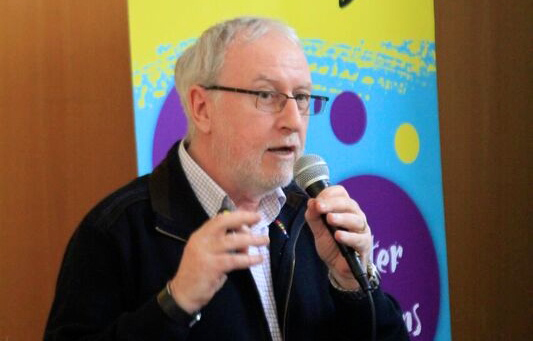
“You’re all welcome, very welcome….” Cruising Association of Ireland Commodore Clifford Brown outlines what his organisation has to offer to experienced sailors and absolute beginners alike. Photo: Alex Blackwell
A star performer. Pat Murphy’s guidance on welcoming and managing new crew drew on his unrivalled experience gained in a nine year round the world cruise. Photo: W M Nixon
However, “inspiring” is the only way to describe the next speaker. Pat Murphy has his top place for ever inscribed in Irish sailing history thanks to his fabulous nine year voyage round the world with his late wife and soulmate Olivia on their fine 40ft cutter Aldebaran. They learned much from it, and as they had guest crews aboard at regular intervals, they learned a great deal more about how to manage and welcome new crew. Pat was hugely generous in imparting nuggets of sound advice and insights culled from an exceptional cruise, and it all combined into a solid body of purest wisdom.
But then came the really serious bit. Chris Reynolds, Director of the Irish Coastguard, took us on an informative tour of his expanding organization, and guided us on the paths to sea safety and the correct course of action in an emergency. These topics had of course come up during the group discussions, where the more senior cruising folk inclined to the view that the joy of cruising is to be found in self-reliance, and if a problem arises you should take pride and satisfaction in solving it yourself, however much the potential or actual risk.
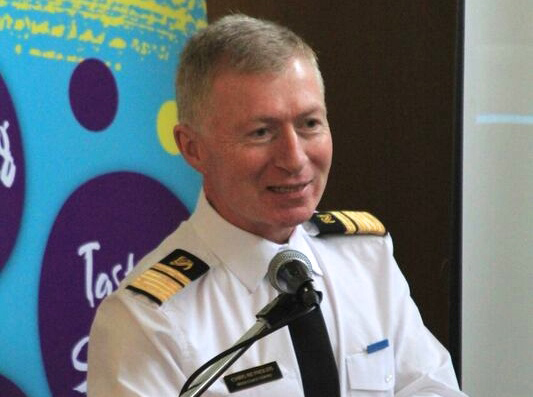
The friendly face of the rescue services – Chris Reynolds is Director of the Irish Coastguard. Photo: Alex Blackwell
But that was appropriate a long time ago, before a proper matrix of rescue and support serves was in place. You just had to be almost totally self-reliant in the old days. Yet nowadays, according to Chris Reynolds, it’s irresponsible to persist in that attitude. His message was simple. If you think you might be getting into trouble, then it’s time to alert the rescue service. For if you know you’re getting into trouble, then it may already be too late to call the rescue services.
This caused some heart-searching among traditionalists, but we hadn’t time to dwell on it, as the next speaker was the force of nature otherwise known as Vera Quinlan of INFOMAR in the Marine Institute in Galway. INFOMAR is the INtegrated Mapping FOr the sustainable development of Ireland’s MARine resource, and Vera Quinlan – a noted ocean cruising sailor in her own right – has been at the heart of it for eight years.
A Force of Nature – Vera Quinlan of INFOMAR. Photo: W M Nixon
If anyone’s interest in the future of the sea had been flagging at this stage, Vera’s enthusiasm soon fired it up again. It’s a whole new world out there, on and under the ocean, when you see it through INFOMAR eyes. And Vera’s vision for Ireland’s maritime future was just the tonic for people who sometimes tend too much to see it as no more than a playground.
The fact that she both works with it, and shows its manifold possibilities for all sorts of sustainable uses, and then goes on to sail across it for pleasure every summer - that was thought-provoking in the extreme. And so too was the concluding item, which had John Leahy, former Commodore of the CAI and a retired airline captain, and Willemien Phelan of Met Eireann in an informal competition to see who had best predicted the weather which would obtain on the day of the conference, using different forecast models in different time spans.
Both had got it pretty much spot on in their predictions a week in advance, but then we were in a spell of routine winter weather with the Great Purple Snake of Atlantis, otherwise known as the Jetstream in high speed mode, weaving across the country with one unpleasantness fairly regularly after another.
“The Great Purple Snake of Atlantis” – Willemien Phelan of Met Eireann with a particularly lurid recent swirling of the Jetstream right across Ireland. Photo: W M Nixon
Since last weekend, as you’ll have noticed the Jetstream took off for two or three days to the sunny south, which consequently wasn’t sunny any more, but Ireland certainly was. However, the Great Snake of Atlantis is due back over us today, but at least you’ll know now why the weather goes to pot when it does.
All this was only part of the wide-ranging presentation given by John and Willemien which showed just how far weather prediction has come on in recent years. The magic Ten Day Forecast may still be out of reach beyond a certain level of accuracy, but they’re closing in on the one week forecast very well indeed these days.
All of which poses a quandary for anyone organising sailing events or planning cruises. For if all the forecasts give the same message, that in a week’s time the weather is going to be plain awful with too much wind for most racing, then you’re faced with the decision of calling it off with plenty of time to spare to enable people to plan other things, or else you just stick to the programme and hope the forecast has been excessively pessimistic.
And on top of that, if several days in advance you do cancel an event whose date was set way back in the winter, when on earth are you going to slot it in later in our current programme, which is jam-packed from one weekend to the next?
But that was only one of many thoughts flying around the Conference last Saturday, and most of them were much more cheerful. The reality is cruising folk just like to get together and talk about boats and cruising until the cows come home, and if a Cruising Conference is organized with a stellar line-up of speakers, it gives it all a sense of extra purpose.
Paddy McGlade, ISA Board Member for Cruising, reviews a successful conference. Photo: W M Nixon
Long after a deservedly happy Paddy McGlade brought this part of the gathering to a conclusion after the draw for the offshore sailing suit donated by Union Chandlery had resulted in a popular win for Terry McCoy of Skerries, people were still contentedly shooting the breeze in the friendly atmosphere of the clubhouse. And the really keen ones were lining themselves up for that night’s annual dinner of the CAI. Cruising people are like that – they’re in for the long haul.
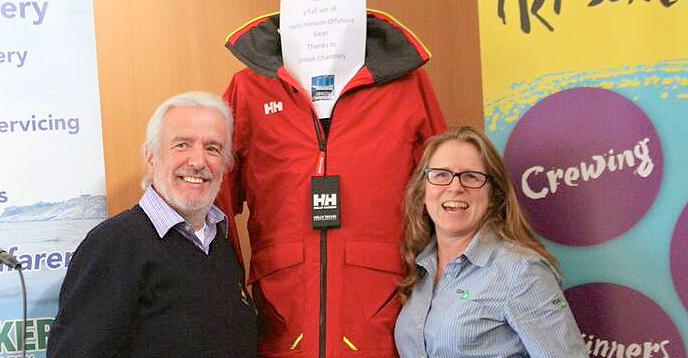
It’s all for Terry! Terry McCoy with Gail MacAllister after the Skerries sailor had won the draw for the sailing suit. Photo: Alex Blackwell
Inaugural Cruising Conference At Howth
The inaugural ISA Cruising Conference at Howth Yacht Club attracted 90 sailors for a very informative day last Saturday.
ISA President David Lovegrove opened proceedings and Keynote speaker Eddie Nicholson and his crew entertained with an excellent show on their adventures to Greenland, with stunning photography, video footage and some eye opening tales of ice movement and local culinary delights. Simon Berrow, of Irish Whale and Dolphin Group and Galway / Mayo Institute of Technology, shared his knowledge of the biodiversity of whales and mammals along our Irish Coastline and gave advise on how leisure boat should approach them and help to ensure their safety.
Sponsorship from Union Chandlery and support from Cruising Association of Ireland helped to made the day a great success, along with the contributions and support from Nicky’s Place on Howth Pier, ICC Publications, Wild Atlantic Way, Met Eireann, INFOMAR, DTTAS, RNLI, Helly Hansen, IWDG, Cool Route & Howth Yacht Club all combined to give every delegate a bag full of fun goodies and useful information.
Experienced offshore sailor and author, Daria Blackwell, made a number of male skippers stop and think, with a talk on Women at the Helm. Many women take on the role of crew on board and never actually helm or rather I should say, skipper. The question that had many male skippers thinking was “If you fell overboard, would your crew be able action a safe ‘man over board?”. Not to mention how much easier it is helm a yacht in to a marina than to be the one jumping off with a line in one hand and a fender in the other. Norman Kean, Fellow of the Royal Institute of Navigation and ICC Publications Editor, gave an excellent explanation of the difference between Vector and Raster Electronic Charts, that left the audience assured that maintaining their knowledge of paper pencil navigation alongside their electronic navigation is always a good idea.
Clifford Brown of the Cruising Association of Ireland brought the room up to date with CAI’s “Crew Together” programme, where the East, West and South coast sailors match crew with boats and give sailors a chance to cruise in each others’ waters. Round the world sailor, Pat Murphy, entertained everyone with his tips on caring for, training and communicating with crew for cruising. In the ethos of the ISA programme of Try Sailing, cruising sailors were encouraged to welcome new crew on board and give them a chance to ‘Try Crewing’.
Vera Quinlan of the INFOMAR project at the Marine Institute, and experienced skipper, had everyone amazed by the detailed information available on the sea bed and the idea of being able to know just where your anchor is landing and what you are sailing over. She had everyone eager to learn more. The final talk on weather could have lasted all day as we all know how important forecasting is for sailing, especially in Irish waters. Willemien Phelan of Met Eireann and Volvo Ocean Race participant, gave a fantastic explanation of weather forecasting with John Leahy, Yachtmaster instructor and pilot.
Irish Sailing Association Treasurer Roger Bannon Resigns
Irish Sailing Association Treasurer Roger Bannon has resigned from the association. The Dun Laoghaire based sailor stood down from the voluntary role citing 'personal work commitments'.
Bannon, who served as President of the association from 1994 to 1996, is credited with the 1993 'Joint Membership Scheme' (JMS). The JMS underpinned the financial viability of the association by making every member of a sailing club also a member of the ISA.
An outspoken critic of former ISA policies, Bannon spearheaded a group of sailors in 2013 calling for change at the association, claiming it had 'lost touch with grassroots sailing'. He rejoined the board in 2014 as its Treasurer under current President David Lovegrove, promising major reform of the national governing body.
A statement on the resignation reads: 'Roger Bannon has resigned as a director and Treasurer of the ISA due to his anticipated ongoing lack of availability as a consequence of his personal work commitments'.
'I am sorry to lose Roger as Treasurer, he put in an inordinate amount of work, firstly as part of the Strategic Review Group and then as Treasurer. I thank him for all that he has done for the ISA', Lovegrove told Afloat.ie
Proposed ISA Constitution To Go Before Members At AGM
#ISA - Irish Sailing Association members will be asked to approve the adoption of a revised ISA Constitution at the organisation's AGM at the Green Isle Hotel on Saturday 9 April.
The ISA says it has been working over the past year to bring its Constitution, Formerly the Memorandum & Articles of Association, up to date in accordance with the Companies Act 2014 as well as to reflect the new direction of the association and the needs of its membership.
The proposed ISA Constitution is available to read or download at the ISA website (the current Memorandum & Articles of Association are also available for comparison). A summary of changes will be published by the ISA next month ahead of the AGM.
'Sailing Passport' Heralds New Era For ISA's Training Programmes
#ISA - It's shaping up to be a year of big changes for trainees, tutors and coaches with the Irish Sailing Association as the organisation evolves to meet the demands of 21st–century sailing.
After taking on board feedback from the training review that formed part of last year's five-year strategic plan, 2016 will see a number of new initiatives introduced – and trainee sailors will be among the first to see the benefits.
These improvements include the simplification of the Small Boat Sailing Scheme, and changes to instructor endorsements to better differentiate between training for specific skills and holistic coaching, as well as putting greater focus on gaining skills and logging time on the water rather than trainees simply collecting certificates.
One of the biggest shifts internally in the association is the introduction of new technological solutions to reduce administration time and associated costs to training centres throughout Ireland.
And for the ISA's current crop of trainee sailors, the public face of that will be the new 'Sailing Passport' scheme.
Essentially an online, cloud-based logbook – accessible from computers, tablets and smartphones anywhere there's an internet connection – the Sailing Passport will replace existing paper-based methods of recording on-the-water activities and achievements.
Whether racing, cruising or just having fun, trainees will be able to record their sailing activities in a format that allows them and their instructors to easily track their progress in acquiring and developing the skills needed for any particular course or module.
Trainees in the Small Boat Sailing Scheme will be the first to benefit from this initiative before it's rolled out to power boating, windsurfing, cruising and other activities across the board.
Patrick Blaney has been leading the research and development of the Sailing Passport for the ISA and is co-ordinating its introduction in association with the association's Regional Development Officers.
As he explains, the passport is a response to the perception expressed in feedback to the ISA's Strategic Review Group that the association's training schemes were too focused on certification landmarks over individual sailors' development of skills.
"It's also part of the ISA development strategy to grow the levels of sailing activity outside of the traditional structured courses, particularly for young sailors," he says.
"The passport, as an online logbook, is designed to facilitate this by focussing on skills and experiences, not on certificates, and to do so in the 'modern' way – dispensing with paper logbooks that are easy to lose or damage, while also enabling training programmes be distributed to users more efficiently online."
Inspiration for the Sailing Passport comes from a similar system in use by Sail Canada for the last five years. That project was developed by former sailing instructors with digital and sports management knowhow, and has since been adopted by skiing chiefs and other sporting organisations in Canada.
The ISA's version is licensed from a sister programme called ChecKlick, and is already fully operational for the Small Boat Sailing Scheme, loaded with all the relevant Joe Soap Cards for skills development that student sailors will see checked off by their club or instructor as they progress, whenever or wherever they access their secure passport online.
But the system also allows individual sailors to add their own records for activities, goals and achievements as they track their training steps with greater accuracy, making for a more holistic approach to sail training over the previous 'gotta catch 'em all' collection of certificates.
The end result also serves as a kind of 'sailing CV', says Blaney, particularly useful for those working towards accreditation as a coach or instructor.
Trialing of the system has lead to some early positive feedback including this from Aengus Kennedy, principal of Rathmullan Sailing and Watersports School in Co Donegal:
"We started to use the ChecKlick system in 2015. The system is straightforward to use and the online tutorials work well as training manuals. Staff were up to speed quickly. Instructors have the opportunity to update each students progress throughout courses from their smartphones or devices which they embraced. Being able to print either certificates or a list of tasks achieved for each student at our leisure is a distinct advantage. Having a database of all students work and not paper logbooks is a big improvement."
The Sailing Passport will mean reduced costs for sailors and administrators alike, with access to the system costing €3 per participant.
With current paper log books costing €5 a pop, and certificates at €2 each, the savings will be significant over time, Blaney underlines.
Yet the costs are secondary to the vision of a more nimble, focused ISA that this project represents, something also reflected in the streamlining of the Small Boat Sailing Scheme itself.
That sees the revision of its upper-tier modules into a single level for each of three streams – Advanced Boat Handing; Start Racing; and Kites & Wires & Adventure – and the introduction of a new single Advanced Instructor Endorsement which will enable more and more clubs and training centres to acquire the resources necessary to offer the full suite of training modules.
What this all ultimately means for trainees is more choice and more flexibility in terms of where they can go to learn the skills they need, and what paths they can take to hone their preferences on the water, without being discouraged by the need for certification in skills that may block their advancement.
The coming year will reveal whether the ISA's first raft of changes will indeed encourage a brighter future for Ireland's young sailors.
A sailing passport briefing document prepared by the ISA is downloadable below.
The Irish Sailing Association has been awarded €323,000 just €100 less than 2015 in the annual payout from Sport Ireland, formerly known as the Irish Sports Council. Rowing Ireland was awarded 210,000.
Sport Ireland, the newly created agency for the development of sport in Ireland, announced a comprehensive package for sporting organisations in 2016. The announcement was made by Minister of State for Tourism and Sport, Michael Ring T.D. in Westport today.
To support Irish participation at the Rio Olympic and Paralympic Games in August and September, a total grant package in excess of €10 million was announced. In addition, with the supports of the services of the new Institute of Sport High Performance Training Centre, at Sport Ireland's National Sports Campus, the total investment in High Performance Sport for 2016 will be well in excess of €11 million.
In addition, there was a package of €10.6 million invested in National Governing Bodies of Sport with a further €5 million investment through the National Network of Local Sports Partnerships.
Speaking at the announcement, Minister Michael Ring said:
"I am pleased to announce this significant investment in Irish sport for 2016, through Sport Ireland's package of grants for the National Governing Bodies of Sport and the Local Sports Partnerships. The grants announced today will not only support the core activities of sports bodies, including their administration, they will also support very important sport programmes such as the Women in Sport and High Performance programmes, and the full range of services provided by Local Sport Partnerships around the country. I am delighted to have been able to increase Sport Ireland's budget by €3 million this year, which has enabled Sport Ireland to support High Performance sport in what is a very important year, with the Rio Olympic and Paralympic Games taking place. In addition, it is envisaged that significant funds will be available through Dormant Accounts Funding for sports programmes in disadvantaged communities to support the recently announced National Physical Activity Plan. The increase in funding for this year is a recognition of the Government's commitment and my own personal commitment to Sport".
Chair of Sport Ireland, Kieran Mulvey, speaking at the announcement added:
"We are delighted to announce a wide range of grants for Governing Bodies which cover the critical period of 2016 towards Rio but also a wide range of important programmes which are covered by the National Governing Bodies of Sport and the Local Sports Partnerships. Sport has flourished over the past number of years despite financial difficulties and have continued to expand their services. Some of the highlights of the today's announcement include:
- Over €1.8 million invested through the International Carding Scheme (Details of which will be announced soon)
- Additional investment has been allocated to the Olympic Council of Ireland to support the training camps and their Rio activities
- Significant investment has been allocated to Paralympics Ireland to support their pre-games camp in Uberlandia and all their games activities
- Additional support was to Hockey Ireland and Pentathlon Ireland who delivered outstanding results in 2015 and are well placed to deliver excellence in Rio
- Support will be provided to the IRFU towards the Olympic Repechage Rugby 7s taking place in UCD in June
- €200,000 will be invested through the Team Ireland Golf Trust to provide direct financial support to a number of golfers as well as additional financial support to hosting the Challenge Tour event in Ireland which is a vital component of the development of Irish Golf and Irish Golfers
- Over €600,000 will be invested in NGBs towards Women in Sport Programmes to ensure opportunities for women across the sporting spectrum (with further investment to be announced across the FAI and IRFU) and a further €114,700 through Local Sports Partnerships
John Treacy, Chief Executive of Sport Ireland explained:
"It's a really exciting time for Sport in Ireland. The establishment of the new agency has given Irish Sport a new home at Sport Ireland's National Sports Campus and with the additional resources made available to us this year we will drive on and continue to develop the Irish Sports sector. While 2016 will be a vital year in relation to Rio, we are also focused on our other obligations including our participation initiatives, supporting events at home and our anti doping programme. 2016 will be an exciting year and I would like to thank the Minister for his support through the last number of years".
Irish Sailing Celebrates the Best of the Best
The Irish Sailing Association Annual Awards ceremony undoubtedly conveyed three clearcut messages. The first is that, in global sailing terms, we’re a wet and breezy little island which nevertheless punches way above our weight. The second is that we live comfortably with a long and very distinguished history of recreational sailing which puts most other nations in the shade. And the third is that Ireland is definitely not the greatest place in the world to be a professional sailor. W M Nixon takes a look back at Thursday’s annual prizefest.
Those unfamiliar with the Royal College of Surgeons in Ireland might think it odd that, in just two short years, its splendid College Hall, at the very epicentre of Dublin on Stephens Green, has come to be seen as the most natural focal point for the annual honouring of our top sailors and clubs.
The College Hall in the RCSI provides an ideal setting for the annual gathering for Irish sailing’s national awards.
Sailors talking about sailing. The Awards Ceremony provides a cherished opportunity for sailors from every discipline to shoot the breeze together.
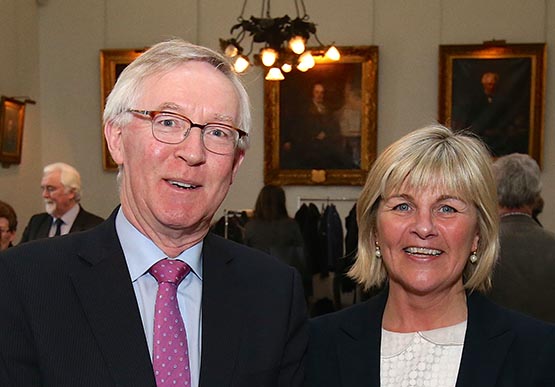
Dragons Den star Bobby Kerr – a sailing man himself – was the lively Master of Ceremonies
But in terms of being a setting which lends itself very positively to such a gathering, College Hall is right on target. It’s a splendid room which is confident with itself without being over the top. It comfortably accommodates the crowd of between 180 and 200 who have come from all over Ireland to celebrate what’s best in our sailing. And as if that weren’t enough, the RCSI has remarkable links with sailing going back more than a hundred years.
John Treacy, CEO of the Sports Council, with Liam Shanahan and ISA President David Lovegrove
So after last year’s first use of the venue, which stemmed from a typically far-sighted suggestion by ISA Board Member Brian Craig, people were keen to go back. And it wasn’t because no-one could think of anywhere better. On the contrary, it was because we’d found that the College of Surgeons is one of those wonderful buildings which make you feel better just from being in it. So in the early days of Spring when we wonder if summer is really going to come at all, a bit of a party in the College of Surgeons is just what the doctor ordered. And as for those doctors and surgeons from the RCSI going sailing, we’ll return to that at the end of this piece. But what of the event itself?
Well, with the Afloat.ie Sailor of the Year award going to a determinedly Corinthian skipper who cheerfully admitted that there’s any amount of professional sailors out there who could probably beat the pants off him, but nevertheless his core interest is offshore racing with family and friends, and if they win within those self-imposed limitations, then so much the better…..There it was, the real voice of Irish sailing, and no mistake.
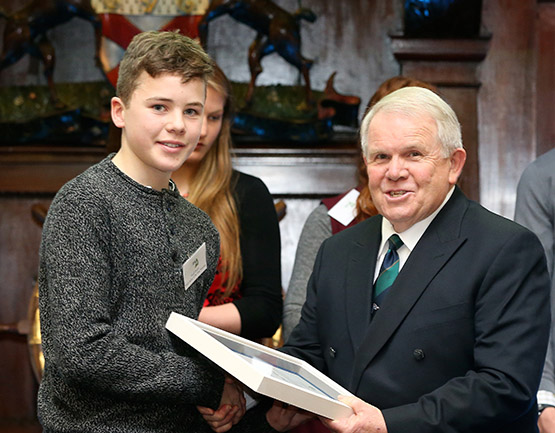
Pierce Purcell of Galway Bay SC with the RIYC’s Michael Boyd, Commodore of the Royal Ocean Racing Club
But what about the clubs through which we go sailing? How can they carry such a wealth of history, and yet be of any contemporary relevance? Here again, the evidence speaks for itself. The new Mitsubishi Motors Sailing Club of the Year has a wonderful history going back to 1831, yet in terms of sailing achievement and voluntary input into the local, regional and national organisation of sailing, it is making a fantastic contribution. And as for its relevance to sailing in the future, independently of the Club of the Year adjudication taking place, this same club was comfortably on its way to being the top ISA Training Establishment in its region, and on the shortlist for the national title too.
Olympian and rising stars – James Espey, Aoife Hopkins and Saskia Tidey
If that’s not an illustration of the way that Irish sailing honours its past while living in the present and looking to the future, then I don’t know what it is. But what’s this third point about Ireland being a cold place for professional sailing? Here again, the assembly in the RCSI was very representative of our Irish sailing population. For sure, there are some very distinguished Irish professional sailors, and there are certainly Irish owners who are prepared to pay the top talents to sail with them. But there’s something about the Irish sailing scene which is inimical to such a setup at home. By all means do it where the weather’s usually benign, and there’s lots of money floating around. But in the Irish climate you sometimes have to be so keen to go sailing despite hostile weather that you just have to rely on nutty amateur crew - the professionals know there’s much better and more reliable pickings elsewhere.
Thus we’ve come to the ironic situation that our top home-based professional sailors are actually our Olympic hopefuls. It’s extraordinary when you think that the modern Olympics were “re-founded” in 1896 in order to celebrate amateur sport, yet now in Ireland just about the only home-based sailors who can be said to be professional are the Olympic aspirants. And if they haven’t accepted that they need a professional approach, then they’re not really at the races at all.
Thus although the friendly Olympian presence of Annalise Murphy, James Espey and Saskia Tidey was much to be welcomed in the very representative throng, generally anyone who was there with any sort of a professional interest in sailing had it as part of a larger business in which actually going sailing is only a small part of the total setup.
Paralympic sailors Ian Costello and John Twomey
Admittedly we did have one Olympian who received an award, John Twomey who took the title in December for his qualification for the Paralympics in September 2016. And he came with added laurels, as on the very day of the ceremony, it had been announced that he and his crew of Ian Costello and Austin O’Carroll had moved up to fifth in the World Rankings. But if you suggested to John Twomey – headed for his 11th Olympiad – that he’s a professional sailor, he’d be convulsed in mirth. Real life is related to an accountancy practice in Kinsale.
So the only other monthly awardee who could remotely be said to be a professional sailor was August winner Ronan O Siochru. who skippered the winning Irish Offshore Sailing boat Desert Star to victory in the 33-strong Sailing Schools Division in the Rolex Fastnet Race 2015. But he’s very definitely running a business - and a very demanding one at that – in which going sailing is only part of it.
Ronan O Siochru with the President
Thus what Thursday’s ceremony was all about was voluntarism and amateur sport, and in case anybody missed the point, it was supposed to be a bit of fun. In this spirit, the greatest trophy in Irish sailing, the might salver for the Helmsman’s Championship, was given an outing. The All Ireland Helmsman’s Championship being an amateurs-only affair, as it is held over an October weekend, inevitably by the time its award ceremony for the salver is shaping up it’s well into Sunday evening. It’s getting dark, and everyone’s tired and wants to go home. So inevitably the handing-over of the historic trophy is a downbeat and somewhat rushed affair.
But as the ISA Annual Awards ceremony is all about handing over prizes with as much ceremony as possible, it was arranged for the salver – which had been hurriedly handed over to successful defender Anthony O’Leary in Dun Laoghaire back in October – to be smuggled out of the O’Leary household down in Crosshaven, secretly taken to Dublin, hidden away in the College of Surgeons, and then formally presented as a surprise extra to the great man after he’d received his Sailor of the Month award for April. He blushed.
Got him! Sailor of the Year 2014 Anthony O’Leary unavoidably missed last year’s awards ceremony, and then in 2015, although though he was Sailor of the Month for April, there were very few people around in October when he successfully defended the Helmsmans Championship Salver. So it was taken secretly to this week’s ceremony, where more than 180 people cheered him to the rafters.
ISA Youth Champions 2015 are Colin O’Sullivan and Doug Elmes, Bronze Medallists in the 420 Worlds.
Before all this, we’d been setting the scene with the ISA Youth Sailors of the Year, who were 420 Worlds Bronze Medallists Douglas Elmes and Colin O’Sullivan, and the ISA Training Centre of the Year, which was Mullingar Sailing Club from Westmeath which headed the Western Region, and overall came in ahead of Foynes YC from the Southern Region and the Royal Irish YC from the Eastern Region.
Katie Johnston of Mullingar Sailing Club with David Lovegrove when MSC was announced as ISA Training Centre 2015.
The new Mitsubishi Motors Sailing Club of the Year is the Royal Irish YC – Commodore James Horan with Billy Riordan of Mitsubishi Motors and David Lovegrove.
But for the RIYC Commodore James Horan, the good news was only beginning, as his club was then announced as the new Mitsubishi Motors Sailing Club of the Year for a host of excellent reasons. We’ll list them in more detail here on Afloat.ie in due course when the traditional handing-over ceremony for the old ship’s wheel trophy is held in the RIYC clubhouse later in the Spring. But meanwhile on Thursday we saw ample reason for it, as two of the Sailor of the Month awards went to very active RIYC members, George Sisk and Tim Goodbody.
July Sailor of the Month George Sisk with the ISA President
Dun Laoghaire Regatta Week 2015 Chairman, Fastnet Race 1987 overall winner, and multiple champion Tim Goodbody was Sailor of the Month in November
Youngest cruising award winner was Fergus Ogden, who in June and July sailed round Ireland with his brother in an open Drascombe Lugger.
Then came the Sailor of the Year announcement. Anyone who was following the voting in the Afloat.ie poll will know it was running very close. But as the poll results are only a quarter of the adjudication process, it was just a couple of days ahead of the awards ceremony when the judges finally made their decision. They came down in favour of Liam Shanahan both for his wonderful and very sporting victory in the Dun Laoghaire to Dingle Race with his family’s J/109 Ruth, and his subsequent success in retaining the Irish Sea Annual Championship title.
His modest acceptance speech was, in effect, a manifesto on behalf of all Irish amateur sailors, and particularly family sailors. The Shanahans are one remarkable sailing tribe right through three generations. And as for that win in the Dun Laoghaire to Dingle Race – well, it was beautiful sailing. Some sailing races are won by brutal slugging. Some are won by sheer cunning. Some inshore races are even won by dirty sailing, and it’s within the rules even if it does the image of our sport no good at all. But some race wins are simply beautiful sailing. And Ruth’s success in Dingle was definitely in that category.
After receiving his award, Liam Shanahan briefly but eloquently outlines his philosophy of sailing
So the ceremony on Thursday concluded with this celebration of the best in Irish sailing, and it chimed well with the mood of the moment and the location, as the current President of the RCSI is Declan Magee who sails from Dun Laoghaire, and he was most welcome at the party and naturally thanked for the use of the hall……
Then as we exited the College Hall, the first doorway we passed was the Sir Thomas Myles Room. He was RCSI President 1900-1902, a wonderful surgeon and a man of prodigious energy who boxed to championship level, and adored sailing. A Home Ruler of Limerick origins. he made his auxiliary ketch Chotah available to take the guns off Conor O’Brien’s Kelpie during the Asgard gun-running of 1914, and landed them in Kilcoole in County Wicklow. And though he was immediately made a Colonel and head of British army surgical services in Ireland on the outbreak of the Great War of 1914-18, he also saw to it that hidden rooms in the major Dublin hospitals under his control were available to treat wounded rebels, indeed anyone who was wounded, during the Rising of 1916.
Builders of the future – the team from Mullingar Sailing Club, ISA Training centre 2015
More recently, a leading sailing figure with links to sailing is Michael O’Rahilly who, when he became a student at RCSI at the end of the 2950s, found that the RCSI Sailing Club consisted of just one neglected Firefly dinghy. By the time he graduated in 1963, he was Club Captain, RCSISC had three Fireflies in top racing condition, and they were the Irish university champions.
Subsequently he went in to play a leading role in Dublin Bay SC, and was the Commodore for the DBSC Centenary in 1984. He follows in a notable RCSI tradition of sailing and working voluntarily for our sport, as an earlier top sailor in the college had been Jimmy Mooney who played a key role in the development of Irish dinghy sailing, and then went on to be our top Dragon sailor for many years, winning the Edinburgh Cup and representing Ireland in the Olympics.
Before Jimmy Mooney another noted character in the RCSI sailing scene was Rory O’Hanlon, who became a noted figure in offshore racing – he won a cup in the 1971 Fastnet Race – and was further renowned for his long distance cruising exploits.
He was noted as a kindly mentor to young cruising hopefuls, gently giving encouragement which could make all the difference to a nervous skipper. One such beginner, who later went on to great achievements, nervously went to Rory O’Hanlon to ask how best he should approach his first major voyage, north towards the Arctic in a little 26-footer.
“Sure, you just keep on sailing, and you’ll get there” said Rory. “Just keep on sailing, that’s all there is to it”. Just keep on sailing. It’s sensible advice. It resonated round College Hall in the RCSI on Thursday afternoon. We should all heed it.
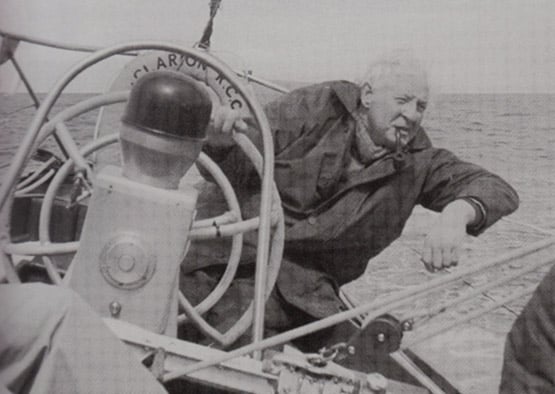
“Just keep on sailing, and you’ll get there”. The late Rory O’Hanlon at the helm of his S & S 43 Clarion with which he won the Philip Whitehead Cup in the 1971 Fastnet Race, and also cruised on long voyages. While a student at the Royal College of Surgeons in Ireland, he was active in the sailing club.
See also: Sailing Awards slideshow



























